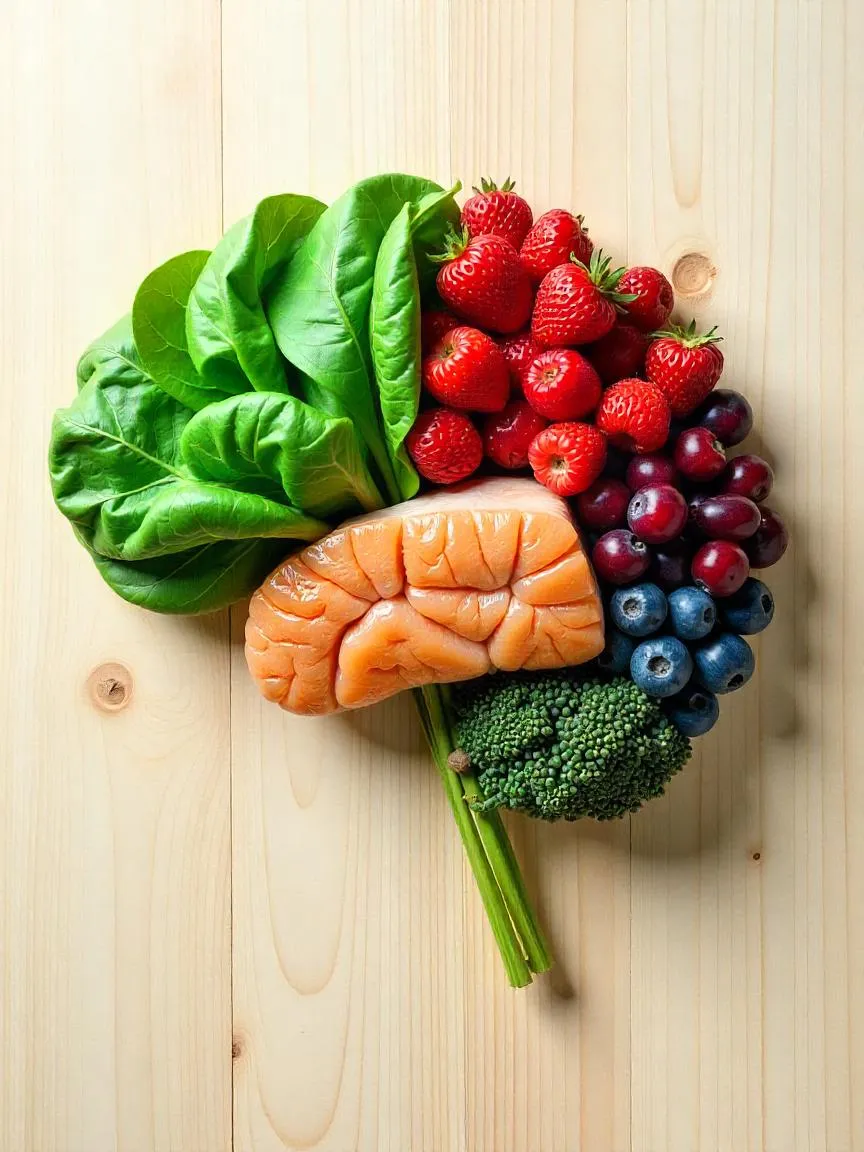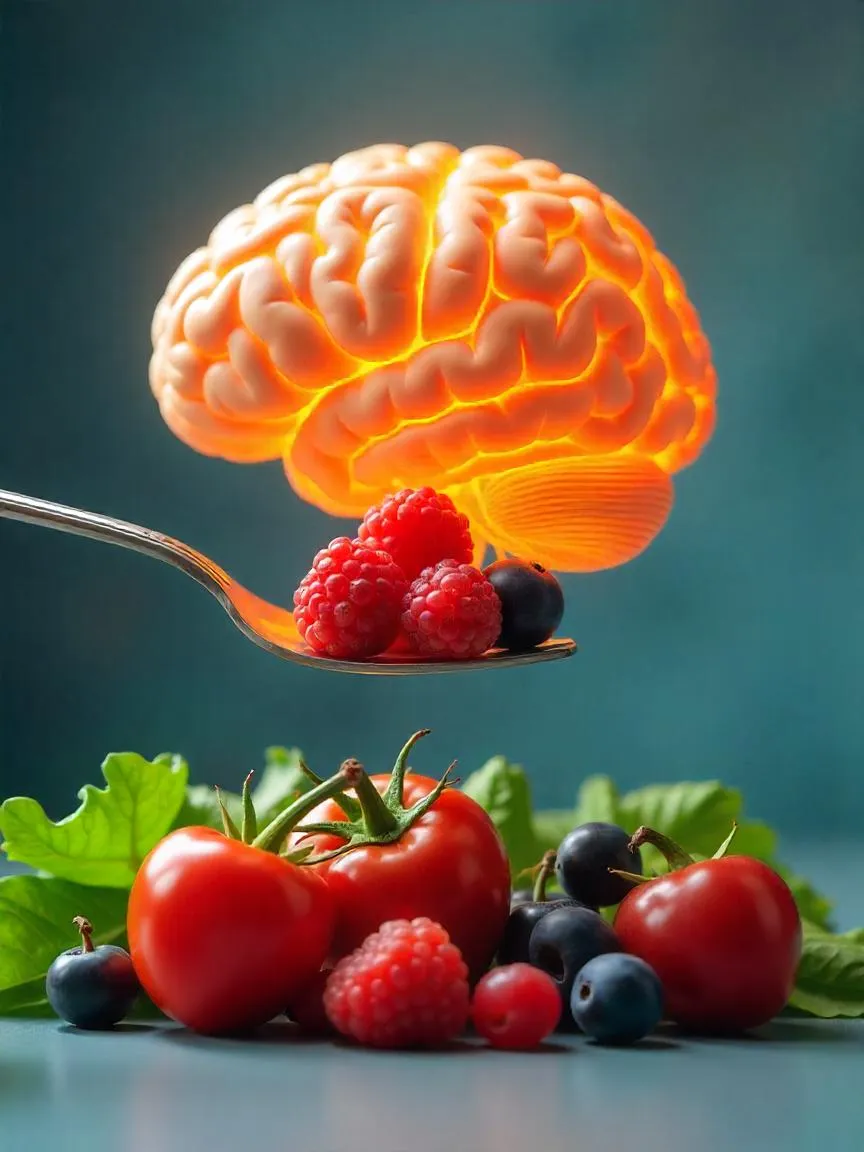Contents
- 🧠 What Is the MIND Diet?
- 🧪 How the MIND Diet Works
- 🧾 Sample MIND Diet Meal Plan
- 🍷 Is Alcohol Part of the MIND Diet?
- 📚 The Research So Far: What Science Says About the MIND Diet
- 🧪 Clinical Trials: What the Evidence Shows About the MIND Diet
- ⚠️ Potential Pitfalls of the MIND Diet
- ✅ Bottom Line: Is the MIND Diet Worth Trying?
The MIND diet—short for Mediterranean-DASH Diet Intervention for Neurodegenerative Delay—is a hybrid of two well-established eating patterns: the Mediterranean diet and the DASH (Dietary Approaches to Stop Hypertension) diet. It was developed by researchers at Rush University in Chicago with the goal of reducing the risk of dementia and the decline in brain health that often occurs as people age.
The MIND diet emphasizes foods and nutrients shown in research to benefit brain health. Like its parent diets, it encourages a plant-based eating pattern, but it specifically focuses on foods that support cognitive function and reduce oxidative stress and inflammation—two key factors involved in the development of Alzheimer’s disease.
The MIND diet has gained significant attention in recent years as emerging studies have associated it with slower cognitive decline and a reduced risk of Alzheimer’s disease, even when not followed perfectly.
🧠 What Is the MIND Diet?
The Mediterranean-DASH Diet Intervention for Neurodegenerative Delay, or MIND diet, was specifically developed to support brain health as we age. With dementia ranking as the sixth leading cause of death in the U.S., researchers have been exploring dietary approaches to help slow or prevent cognitive decline.
In 2015, Dr. Martha Clare Morris and colleagues at Rush University Medical Center and the Harvard T.H. Chan School of Public Health introduced the MIND diet through two landmark studies. They combined elements of the Mediterranean diet, known for heart health, and the DASH diet, known for lowering blood pressure—both of which indirectly support brain function.
To assess the diet’s impact, the researchers analyzed data from over 1,000 older adults enrolled in the Rush Memory and Aging Project (MAP). These participants were free of dementia at the start and were followed for up to 10 years. They completed detailed food frequency questionnaires and underwent regular cognitive testing.
Based on their findings, the research team created the MIND diet score, ranking food choices according to how strongly they correlated with slower cognitive decline. The results were striking: those with the highest MIND diet scores experienced significantly less cognitive decline than those with the lowest scores.
Interestingly, the MIND diet outperformed either the Mediterranean or DASH diet alone in protecting brain health—suggesting that targeted dietary strategies may offer unique benefits for cognitive aging.
🧪 How the MIND Diet Works
The goal of the MIND diet is to directly prevent the onset or slow the progression of dementia by emphasizing foods that protect the brain. While it draws inspiration from both the Mediterranean and DASH diets—both known for supporting cardiovascular health—the MIND diet goes a step further by focusing on nutrients and foods specifically tied to cognitive function.
Like its parent diets, MIND emphasizes plant-based eating and limits animal-based and high saturated fat foods, but it introduces specific guidance on what to prioritize and what to limit for optimal brain health.
✅ Brain-Healthy Foods to Include:
- Whole grains – 3 or more servings per day
- Vegetables (non-leafy) – At least 1 serving daily
- Leafy green vegetables – 6 or more servings per week
- Nuts – 5 or more servings per week
- Beans – 4 or more meals per week
- Berries (especially blueberries and strawberries) – 2 or more servings per week
- Poultry – 2 or more meals per week
- Fish – At least 1 meal per week
- Olive oil – Use as the main added fat
⚠️ Foods to Limit:
These items are higher in saturated and trans fats, which may negatively impact brain health:
- Pastries and sweets – Less than 5 servings per week
- Red meat (beef, pork, lamb, processed meats) – Less than 4 servings per week
- Cheese – Less than 1 serving per week
- Fried or fast foods – Less than 1 serving per week
- Butter or stick margarine – Less than 1 tablespoon per day
By emphasizing these evidence-backed food choices, the MIND diet aims to slow cognitive decline, reduce inflammation and oxidative stress in the brain, and support long-term mental clarity.
🧾 Sample MIND Diet Meal Plan
This sample meal plan is designed to reflect the principles of the MIND diet, totaling approximately 2,000 calories—a standard daily intake for the average adult. Adjust portions or snacks to meet your specific calorie needs. For personalized guidance, consult with a registered dietitian.
🥣 Breakfast
- 1 cup cooked steel-cut oats
- 2 tablespoons slivered almonds
- ¾ cup fresh or frozen blueberries
- Sprinkle of cinnamon
🍊 Morning Snack
- 1 medium orange
🥗 Lunch
Beans and Rice Bowl
- In a medium pot, heat 1 tbsp olive oil
- Sauté ½ chopped onion, 1 tsp cumin, and 1 tsp garlic powder until softened
- Stir in 1 cup canned beans, drained and rinsed
- Serve over 1 cup cooked brown rice
Side Salad
- 2 cups mixed greens with chopped cucumbers and bell peppers
- Dressing:
- 2 tbsp olive oil
- 1 tbsp lemon juice or vinegar
- ½ tsp Dijon mustard
- ½ tsp garlic powder
- ¼ tsp black pepper
🥜 Afternoon Snack
- ¼ cup unsalted mixed nuts
🍽️ Dinner
- 3 oz baked salmon, brushed with same dressing used at lunch
- 1 cup steamed cauliflower
- 1 whole grain roll, dipped in 1 tbsp olive oil
🍷 Is Alcohol Part of the MIND Diet?
Originally, yes. Wine was one of the 15 dietary components in the original MIND diet score, with moderate consumption (typically one glass per day) linked to better cognitive health.
However, later MIND trials removed wine from the score for safety considerations.
Alcohol’s effects vary widely depending on personal and family health history, so:
Whether to include alcohol is a personal decision best made in consultation with your healthcare provider.
📚 The Research So Far: What Science Says About the MIND Diet
The MIND diet emphasizes foods rich in vitamins, carotenoids, and flavonoids, which are believed to protect the brain by reducing oxidative stress and inflammation. While its primary goal is to support cognitive health, it may also help reduce the risk of heart disease, diabetes, and cancer, thanks to its overlap with the Mediterranean and DASH diets.
🧠 Cohort Studies on Brain Health
In a landmark study from the Rush Memory and Aging Project:
- Participants with the highest MIND diet scores had a 53% lower risk of Alzheimer’s disease.
- Even moderate adherence to the diet was associated with a 35% reduced risk compared to those with the lowest adherence.
These findings held true even after controlling for variables like physical activity, cardiovascular health, depression, and obesity—suggesting that the MIND diet itself plays an independent role in preserving brain function.
🧪 Additional Findings
Other large cohort studies have also found that people with higher MIND diet scores showed:
- Better memory and cognitive performance
- Larger total brain volume
- Slower rates of cognitive decline
- Lower risk of dementia, even among those already at higher risk (e.g., with a history of stroke or Alzheimer’s)
🧪 Clinical Trials: What the Evidence Shows About the MIND Diet
While observational studies on the MIND diet are promising, randomized controlled trials (RCTs)—the gold standard of scientific research—have produced more cautious findings.
🧠 The 2023 MIND Trial
A 2023 RCT enrolled 604 adults aged 65 and older who:
- Had a BMI over 25
- Ate a suboptimal diet
- Had no cognitive impairment at baseline
- Had a first-degree relative with dementia
Participants were randomly assigned to:
- A MIND diet intervention group, or
- A control group eating their usual diet
🧑⚕️ Both groups were guided by registered dietitians, encouraged to reduce calorie intake by 250/day, and coached in healthy eating behaviors.
🔍 Key Findings:
- Both groups improved cognitive performance
- Both groups lost about 11 pounds
- The MIND group showed greater improvement in diet quality
- MRI brain scans showed no differences between groups
🔎 Why weren’t the results more dramatic?
Experts noted:
- The control group also improved their diet (through coaching on goal-setting, mindful eating, and tracking)
- The 3-year study duration may have been too short to detect meaningful changes in brain structure or long-term cognitive decline
⚠️ Other Considerations
- Socioeconomic factors matter: Research shows that greater poverty and less education are linked with lower MIND diet adherence and poorer cognitive outcomes
⚠️ Potential Pitfalls of the MIND Diet
The MIND diet is intentionally flexible, which can make it more sustainable for some—but also more challenging for others.
🧩 Lack of Structure Can Be a Barrier
- The MIND diet doesn’t provide set meal plans, portion sizes, or calorie targets.
- It requires individual planning and the ability to prepare meals using the recommended foods.
- People who don’t enjoy cooking or who frequently dine out may struggle to consistently meet the diet’s goals.
- Restaurant dining may require extra effort to review menus and select brain-healthy options.
📏 No Built-In Exercise or Lifestyle Guidance
- Unlike other health-promoting eating patterns, the MIND diet does not include guidance on physical activity, which is also important for brain and overall health.
- Without portion guidance or calorie awareness, some individuals may overeat healthy foods, potentially limiting benefits.
✅ Bottom Line: Is the MIND Diet Worth Trying?
The MIND diet offers a flexible, science-informed approach to eating that draws from two well-researched patterns: the Mediterranean and DASH diets. Together, these diets have shown benefits for heart health, blood sugar control, healthy aging, and reduced risk of chronic diseases.
Although current research does not yet confirm that the MIND diet slows cognitive aging over time, early studies suggest it may help preserve brain health and cognitive function, especially when adopted as part of an overall healthy lifestyle.
When combined with a balanced plate model and attention to calorie needs, the MIND diet can also support healthy weight loss. As with any dietary plan, long-term benefits will depend on individual habits, consistency, and lifestyle factors such as physical activity, sleep, and social engagement.
More research is needed to explore the MIND diet’s effects in diverse populations and over longer durations—but it remains a promising and achievable strategy for supporting both body and brain health.












